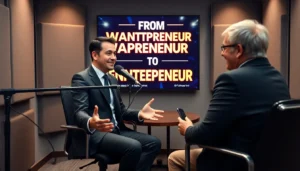When it comes to navigating the labyrinth of career choices, understanding career development theory can feel a bit like deciphering ancient runes. But fear not. This article takes the mystery out of career development theories, making it not only simple but also, dare we say, fun? Whether you’re a seasoned professional or a fresh graduate looking for that elusive first job, knowing these theories can equip you with the tools to make informed decisions about your career. With a sprinkle of humor and solid information, let’s embark on this educational journey together.
Table of Contents
ToggleUnderstanding Career Development Theories

Career development theories provide frameworks that help individuals navigate their professional paths. These theories investigate into how personal characteristics, societal influences, and economic factors affect career choices. Understanding these concepts is crucial for anyone looking to align their skills and passions with potential career paths. They aren’t just academic jargon: these theories serve real-world applications, allowing people to reflect on their decisions, identify their motivations, and take actionable steps towards their goals.
Historical Context of Career Development
The historical context of career development theory is quite intriguing. Initially, career guidance was largely influenced by economic needs during the Industrial Revolution, where labor was simplified and divided. Fast forward to the mid-20th century, and figures like Frank Parsons emerged, laying the groundwork for theory-based career guidance. Parsons emphasized the importance of self-assessment and occupational information. This shift led to numerous advancements in the field, opening doors to specialized theories that consider not just the job market but also personal aspirations and social changes. By understanding this historical backdrop, one can appreciate how far career development has come and acknowledge its relevance today.
Major Theories of Career Development
When speaking about career development theories, a few key figures stand out.
1. Super’s Developmental Theory
Donald Super introduced a developmental approach that emphasizes the idea of career stages. He believed that career development is a lifelong process, influenced heavily by self-concept and life experiences. His framework identifies stages such as growth, exploration, establishment, maintenance, and decline. Each stage is characterized by specific milestones that individuals typically encounter as they progress in their careers. This theory encourages individuals to view their careers holistically, integrating personal values and evolving identities.
2. Holland’s Theory of Career Choice
John Holland’s theory centers around the idea that individuals thrive in work environments that match their personality types. He categorized personalities into six types: realistic, investigative, artistic, social, enterprising, and conventional. The congruence between an individual’s personality and their job choice heavily influences job satisfaction and career success. This theory underscores the importance of self-awareness in career planning, knowing who you are can guide you to what you’ll love doing.
3. Krumboltz’s Social Learning Theory
John Krumboltz offered insights into how learning experiences shape career choices. His theory posits that behavior is influenced by environmental factors, personal beliefs, and observations of others. From this perspective, career decisions are not only based on individual interests but also on what people learn from their surrounding world. Krumboltz emphasized the importance of adaptability in career development, advocating for lifelong learning and flexibility in changing career paths.
Practical Applications of Career Development Theories
These career development theories are not just academic: they have tangible applications in today’s career services.
Role of Career Assessment Tools
Assessment tools like personality inventories, skills assessments, and interest inventories draw from these theories. They provide individuals with insights into their strengths and weaknesses, helping to shape career decisions. For instance, someone who scores high in Holland’s artistic category might benefit from career counseling directed towards creative fields, while those strong in realistic traits might find fulfillment in more hands-on vocations. Organizations employ these assessments to streamline recruitment processes, ensuring a better fit between potential employees and job roles.
Impacts of Technology on Career Development
The advent of technology has significantly transformed the landscape of career development. Online platforms for job searching, networking, and skills training have made career advancement more accessible than ever. Also, the rise of remote work has reshaped traditional career trajectories. Individuals now have the opportunity to connect globally with companies, expanding their career options well beyond geographical limitations. This digital shift has led to an increase in online training programs and learning resources, so allowing individuals to adapt to market demands easily.
Future Trends in Career Development Theory
As society continues to evolve, so too will career development theories. Expect to see a growing focus on intersectionality, as diverse identities influence career choices. Also, flexibility and adaptability will be key themes as dynamic job markets require individuals to continually reassess their paths. The integration of artificial intelligence in career services may also emerge, providing personalized insights based on vast data analysis. These trends highlight the necessity for continuous learning and adaptability in navigating future career landscapes.


